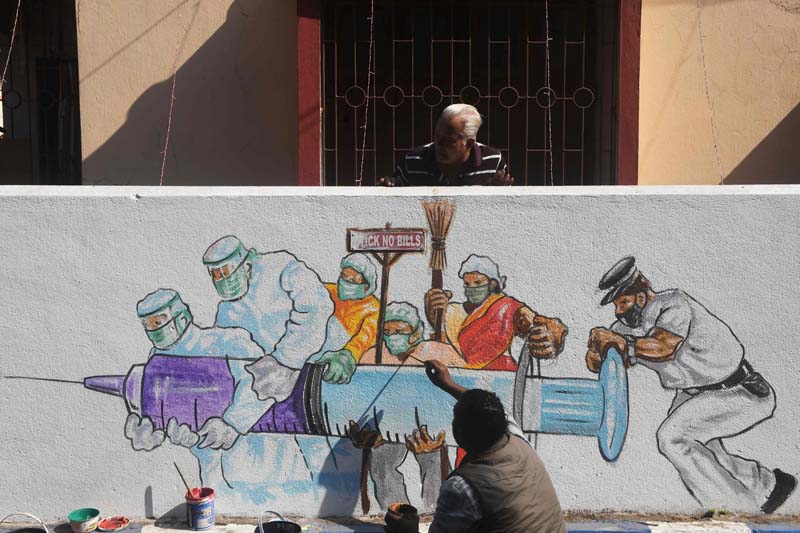
NEW DELHI: India approved the emergency use of two COVID-19 vaccines yesterday, as nations across the world raced to get their populations inoculated to beat back surging infection numbers. More than a year after COVID-19 first emerged it has killed 1.8 million people out of 84 million cases, and governments hope that recently approved vaccines can stop a cycle of economically crippling restrictions.
Yesterday, Britain became the latest country to warn of tougher measures to come, Prime Minister Boris Johnson admitting he was "reconciled" to the prospect hours after his country registered a new daily record of 57,725 COVID-19 cases. But he told the BBC "we can see the way ahead", revealing that 530,000 doses of the newly approved AstraZeneca/Oxford vaccine will be available for use from today.
Britain has already vaccinated around one million people with the Pfizer-BioNTech vaccine, and Johnson said he hoped tens of millions would get the new jab in the next three months. India, the world's second-most infected nation, yesterday authorized the use of the AstraZeneca/Oxford vaccine as well as one by local pharmaceutical firm Bharat Biotech.
The Serum Institute of India, the world's biggest manufacturer of vaccines, has said it is making between 50 and 60 million doses a month of the former vaccine. India has already held nationwide drills to prepare for one of the world's biggest vaccination programs, aiming to inoculate 300 million of its 1.3 billion people by mid-2021.
Israel has claimed the fastest start to vaccinations so far, saying yesterday that two million people -around a fifth of its population - would have both the required shots by the end of January. "We are breaking all the records," Prime Minister Benjamin Netanyahu said on Friday, when one million had already received their first jab. Egypt approved the use of a vaccine developed by Chinese pharma giant Sinopharm yesterday, with its rollout expected later this month.
Hungary also turned its attention to the Chinese vaccine, despite flirting with acquiring Russia's controversial Sputnik V jab. "We know that the Russian vaccine is good, but there is not enough of it and probably will not be," Prime Minister Viktor Orban said yesterday, while criticizing the EU's approach to acquiring shots. For its part, Russia said it had vaccinated more than 800,000 people and distributed 1.5 million doses.
Germany's Robert Koch Institute said yesterday that 238,809 people have been vaccinated there - a far cry from neighboring France, where the government has come under pressure over a slow rollout. "The whole healthcare community does not understand why there is such a difference with Germany: Germany vaccinates 20,000 people a day, we are at 50," Professor Mehdi Mejdoubi of the Valenciennes hospital center in France's north told BFMTV.
The new president of Switzerland, which borders both countries, admitted the country had underestimated the pandemic between July and September. "We thought we could bring the virus under control… we were far from it," Guy Parmelin, who took office on Jan 1, told the newspaper SonntagsBlick. The situation in the United States, already the world's worst-hit country, has continued to deteriorate as it saw the highest number of infections recorded in one day on Saturday, with more than 277,000.
As the US Senate delayed approving a long-awaited $900 billion pandemic relief package, vandals targeted the home of its Republican leader Mitch McConnell. "Were's [sic] my money," and "Mitch kills the poor," was daubed on McConnell's front door and window in Louisville, US media reported. Veteran talk show host Larry King meanwhile became the country's latest high profile case as he was hospitalized in Los Angeles.
Numerous countries announced or imposed new restrictions over the weekend to counteract rising infections, including Zimbabwe, which reintroduced a national lockdown with immediate effect on Saturday. Gibraltar also imposed a second lockdown, while Greece extended its own strict measures until Jan 10. Nightlife shut down in Bangkok, while Tokyo's governor asked for a state of emergency to be declared in the Japanese capital and curbs were extended in North Korea's Seoul until January 17.
France hiked the start of its curfew from 8 pm in 6 pm in hard-hit eastern areas - but some New Year's revellers were already disobeying the measure. More than 1,200 revelers were booked on the weekend after partying for more than two days at an illegal rave in the northwest. "We knew what we were risking… we had to party, for a year everything has been stuck," said a 20-year-old waitress at the rave. Manchester City defender Benjamin Mendy also got into trouble for New Year's celebrations after breaching rules by hosting a gathering at his house. - AFP




